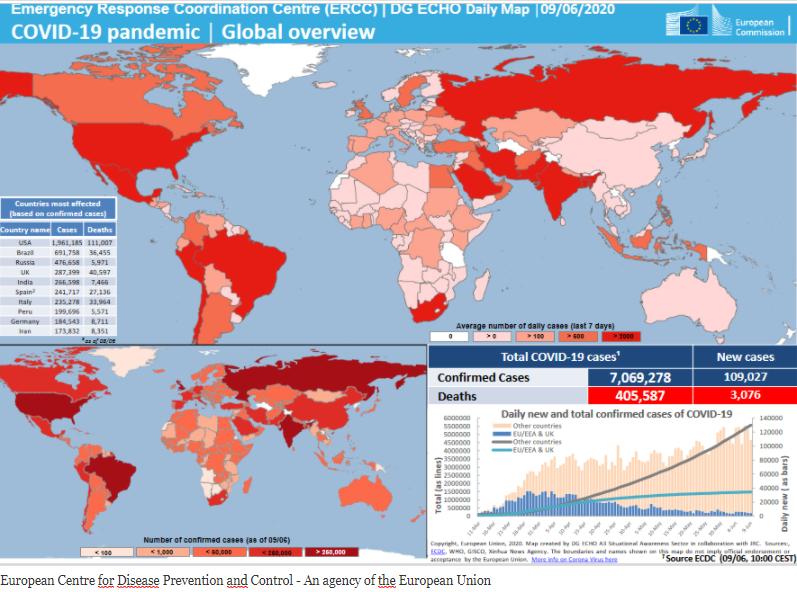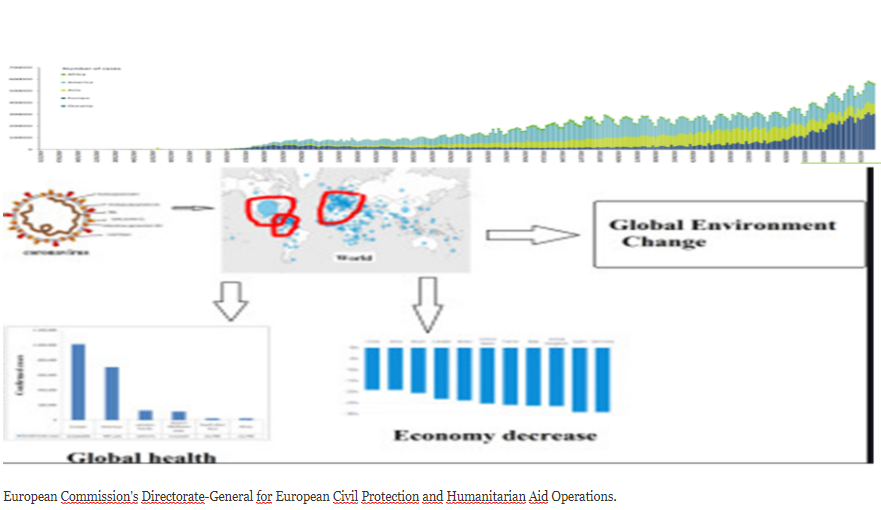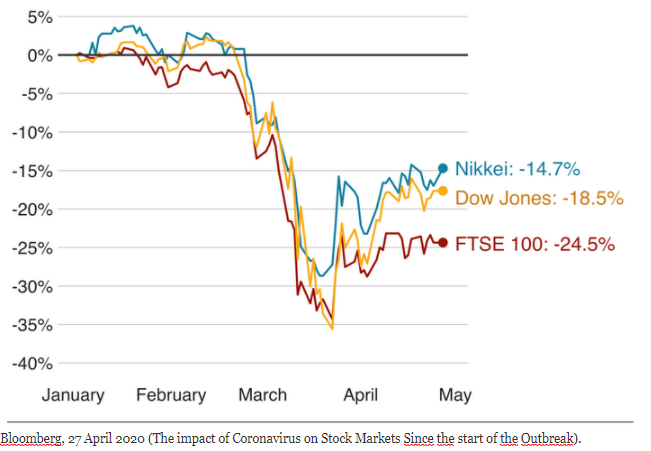An old joke has it that nostalgia is not what it used to be. In the same perspective, the future of the world economy is not what it used to be either, as the striking rise in COVID-19 pandemic rolls on. Faced with the complex challenges of the pandemic, though, many private businesses, among them micro, small and medium enterprises (MSMEs) have moved ahead with innovations1 at a pace that was previously almost unimaginable. These innovative interventions serve, among others, to help prevent the spread of infections, intercede in the business disruption that has resulted from lockdowns, and contain the growing economic and social despair (figure 1).
Figure 1.: Global Footprint of COVID-19 as of July 2020.

Recent innovations have helped businesses, policy makers and social planners to turn around some of their – financial and other – hardships. The analysis in this article highlights a select range of such successful enterprise-based approaches and innovations, with the purpose of arming policy makers, businesses, and economies against the consequences of the current pandemic and possible future shocks.
The impact of COVID-19 on MSMEs since March 2020
By the beginning of November 2020, the pandemic that started in 2019 has peculiarly peaked in various countries, including in some earlier epicenters, where COVID-19 has returned as a second wave. In addition to resulting health crisis, the disease is dealing crippling blows to economies. For MSMEs, this meant they must face overwhelming and competing challenges, having to navigate uncharted waters dealing with the impacts of the pandemic (figure 2 and 3). Financial debts have escalated and continue piling up; transport systems have come to a complete halt; busy restaurants that once teamed with clients stand empty and idle; to name just a few. At normal times, MSMEs form the cornerstone of global economies and are known to generate 44% of U.S. economic activity, 65% of new employment and around 50% of U.K. private sector revenue.[2] With over 85% of MSMEs fully or partially closed, the pandemic is resulting in enormous problems for cash liquidity and workforce maintenance. While policy makers across the globe have responded with both fiscal and monetary stimulus, these are not enough.
The global response
By June 2020, also prompted a series automatic fiscal insurance mechanisms and social safety nets amounting to about 20% of global stimulus package, exclusively for the MSMEs. These were, led by major G20 economies such as the United States, China and European Union countries, all to bolster and frontload the recovery of growth. With the deepening of the uncertainty, hand-wringed industrial entrepreneurs in the digital, education, medical , retail and tourism sectors also began to take bigger risks, investing in new ways of doing business to flank a rational discourse and catalyzing visionary innovations to better deal with the challenges. These have significantly helped the global response, but the economic rage proved more difficult to stop due to the multiple origin.
In a strongly connected and integrated world, the negative impacts of the disease on the global economic workforce – through mortality (those who die) and morbidity (those who are incapacitated or caring for the incapacitated and unable to work for a period) – is becoming increasingly clear. Additionally, amidst the slowing down of economies with interruptions to production, the functioning of global supply chains is being dramatically disrupted. Companies across the world, irrespective of size, dependent upon inputs from the global supply chains are experiencing contractions in production (figure 2).
Figure 2.: Widespread rise in infection triggered economic downturn.

There have also been fundamental changes in consumer behaviour and routes to market, further knocking businesses off balance. The most apparent impact has been the forced furloughs and layoffs across many sectors, most notably aviation, education, media, and IT industries, as well as the stock market dive (figure 3). Formulating an adequate response to these far-reaching consequences of the pandemic requires of policy makers and social planners that they step up and actively promote agile ways of working and value chain transformation.
Figure 3.: The Impact of COVID-19 on Stock Markets.

To survive the pandemic or even emerge from it stronger, MSMEs across the globe have faced the crisis with a spirit of innovation, accelerating digital transformation, establishing variable cost structures, implementing various forms of agile operations, creating new lines of service, and expanding existing offerings. These innovative adventures have touched almost all sectors of economic activities. Some particularly inspiring examples can be found in box 1.
Box 1. Innovative actions of MSMEs
Restaurants everywhere, forced to close their doors, have embraced take-away and delivery. Not only did they rapidly reorganize their ‘live’ practices; they have also quickly adapted to using – or sometimes even designing their own – online order platforms and apps.
Banks are having to change their operations drastically. While risk-management teams are working hard to catch up with cascades of credit risk, online tools for ensuring the continuation of financial traffic are being developed in rapid speed. Such tools will drastically reduce costs for retail and small-business, now and in the future.
The health sector is not lagging behind when it comes to innovations. Asimov Robotics in India, for instance, developed robots that are being deployed in hospital isolation wards to carry food and medicines, which eases the pressure on medical staff. Start-ups including KlinicApp and Practo are providing COVID-19 tests at home and online consultation with doctors through their platform.
Repurposing products has also proven an innovative way to face this pandemic. Gin distilleries in the UK and Ireland have repurposed some of their gin to produce hand sanitizer gel. West London-based business Pai Skincare also switched to making hand sanitizer and started to distribute it to local businesses, schools and communities.
Conclusion
In response to the economic devastation resulting from the coronavirus, governments across the globe have initiated with various stimulus packages that alleviated some, but far from all depressive effects. Now, faced with the so-called ‘second wave’ of the pandemic, it is becoming increasingly apparent that the most promising solutions are coming from the private sector, mostly in the form of highly effective process and product-innovations. The approaches and innovations introduced by MSMEs are allowing enterprises to continue their business, creating a large number of additional jobs and compensating for the gaps left by the deficient financial packages of national governments. In short, innovation, creativity and mass entrepreneurship have provided new momentum for economic growth and job creation, even in this raging pandemic. Policy makers could learn much from the resilience MSMEs have shown over the last year. For them, the most promising course of action, and an intervention that would greatly benefit the global economy, would be to actively stimulate and support the scaling up of successful innovations. In this way, not only can economies survive this pandemic, but emerge from it more resilient and shock-proof than before this crisis.
Footnotes
- Innovation refers to the ability to go beyond what already exists through the implementation of something new or by producing a significant improvement of what is already present. Generally speaking, creativity and innovation are typically part of human activities, but they are stimulated and run fast when the need for new or different solutions necessary to solve issues and improve the human condition is stronger.
- Source: CNBC: Marketing, Media and Money (Distilleries making hand sanitizer? How small businesses are pivoting due to the coronavirus, referenced 9th of November 2020).
